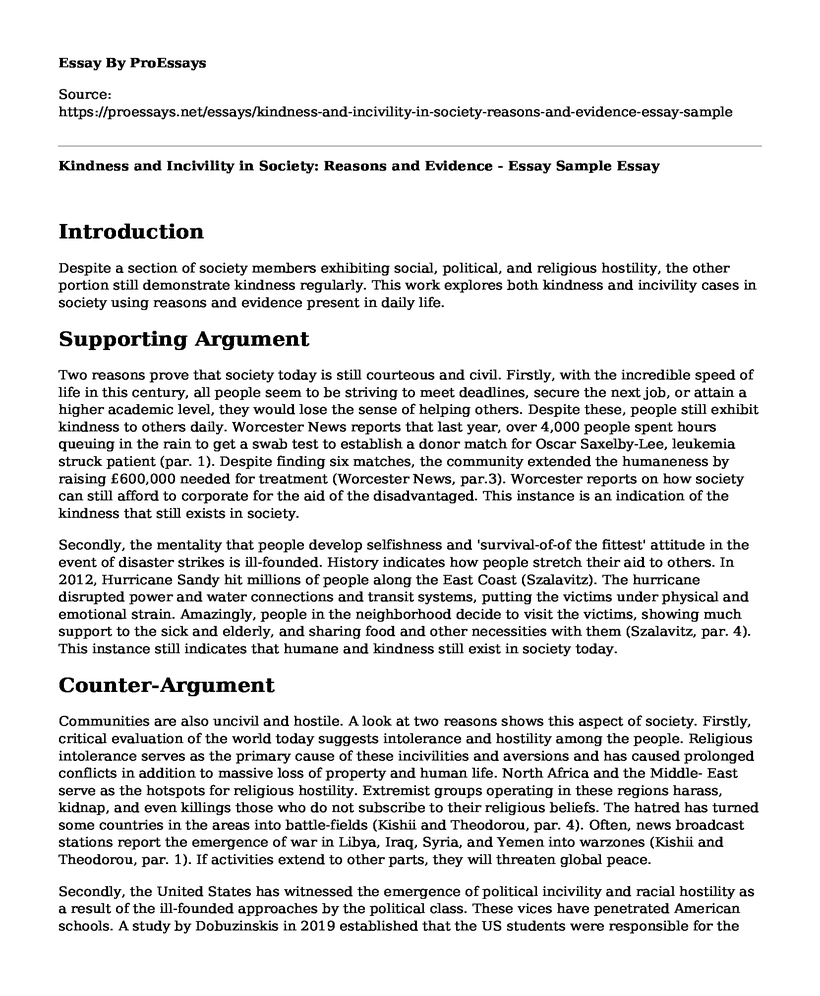Introduction
Despite a section of society members exhibiting social, political, and religious hostility, the other portion still demonstrate kindness regularly. This work explores both kindness and incivility cases in society using reasons and evidence present in daily life.
Supporting Argument
Two reasons prove that society today is still courteous and civil. Firstly, with the incredible speed of life in this century, all people seem to be striving to meet deadlines, secure the next job, or attain a higher academic level, they would lose the sense of helping others. Despite these, people still exhibit kindness to others daily. Worcester News reports that last year, over 4,000 people spent hours queuing in the rain to get a swab test to establish a donor match for Oscar Saxelby-Lee, leukemia struck patient (par. 1). Despite finding six matches, the community extended the humaneness by raising £600,000 needed for treatment (Worcester News, par.3). Worcester reports on how society can still afford to corporate for the aid of the disadvantaged. This instance is an indication of the kindness that still exists in society.
Secondly, the mentality that people develop selfishness and 'survival-of-of the fittest' attitude in the event of disaster strikes is ill-founded. History indicates how people stretch their aid to others. In 2012, Hurricane Sandy hit millions of people along the East Coast (Szalavitz). The hurricane disrupted power and water connections and transit systems, putting the victims under physical and emotional strain. Amazingly, people in the neighborhood decide to visit the victims, showing much support to the sick and elderly, and sharing food and other necessities with them (Szalavitz, par. 4). This instance still indicates that humane and kindness still exist in society today.
Counter-Argument
Communities are also uncivil and hostile. A look at two reasons shows this aspect of society. Firstly, critical evaluation of the world today suggests intolerance and hostility among the people. Religious intolerance serves as the primary cause of these incivilities and aversions and has caused prolonged conflicts in addition to massive loss of property and human life. North Africa and the Middle- East serve as the hotspots for religious hostility. Extremist groups operating in these regions harass, kidnap, and even killings those who do not subscribe to their religious beliefs. The hatred has turned some countries in the areas into battle-fields (Kishii and Theodorou, par. 4). Often, news broadcast stations report the emergence of war in Libya, Iraq, Syria, and Yemen into warzones (Kishii and Theodorou, par. 1). If activities extend to other parts, they will threaten global peace.
Secondly, the United States has witnessed the emergence of political incivility and racial hostility as a result of the ill-founded approaches by the political class. These vices have penetrated American schools. A study by Dobuzinskis in 2019 established that the US students were responsible for the derogatory remarks about immigrants (par. 2, 3, 9). The students would also often disparage the various ethnic groups in the nation. Dobuzinskis writes that principals across the country witnessed a rise in hateful and hostile remarks from students targeting people’s political opinions and ethnicity, and indicated a 17% increase in hate crimes in the country (par. 11). This research illustrates the increasing incivility and hostility in society.
Conclusion
The community today exhibits both kindness and hostilities to a section of people. The understanding and humaneness spring from the fundamental appreciation of the need to support one another. Conversely, beliefs in the different political and religious subscription amongst the people cause most of the hostilities. Despite subscribing to various political, social, or religious stands, people need to practice tolerances for the betterment of society.
Works Cited
Dobuzinskis, A. (2019, March 13). Political incivility, racial hostility roil US high schools, study finds. https://www.reuters.com/article/us-usa-education-high-schools/political-incivility-racial-hostility-roil-u-s-high-schools-study-finds-idUSKBN1QU0PJ
Kishii, K., & Theodorou, A. F. (2016, July 7). 6 facts about religious hostilities in the Middle East and North Africa. https://www.pewresearch.org/fact-tank/2016/07/07/6-facts-about-religious-hostilities-in-the-middle-east-and-north-africa/
Szalavitz, M. (2012, October 31). How disasters bring out our kindness. https://healthland.time.com/2012/10/31/how-disasters-bring-out-our-kindness/
Worcester News. (2020, March 2). Proof our society is still kind. https://www.worcesternews.co.uk/news/18275694.comment-proof-society-still-kind/
Cite this page
Kindness and Incivility in Society: Reasons and Evidence - Essay Sample. (2023, Aug 02). Retrieved from https://proessays.net/essays/kindness-and-incivility-in-society-reasons-and-evidence-essay-sample
If you are the original author of this essay and no longer wish to have it published on the ProEssays website, please click below to request its removal:
- Essay Sample on Troubleshooting Communication
- Volunteering and Philanthropy Essay Example
- Essay Example on Feminism in Society: Striving for Equality & Protection
- Essay Sample on Cultural Competence: Improving Health Care Experiences for Minority Patients
- Labor Unions: Enhancing Employer-Employee Relationships - Report Sample
- Article Review Example on Notes from Under the Dome: Pro-Life Stance by George McKenna
- LGBT Community Analysis - Free Paper Example







